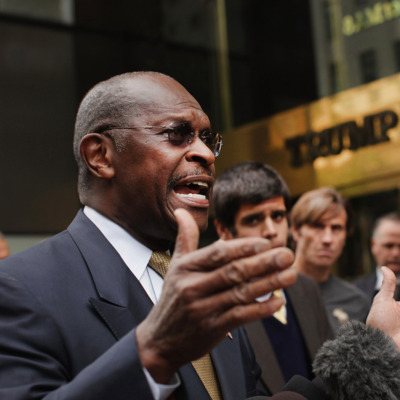
President Trump has expressed dissatisfaction with Federal Reserve chair Jerome Powell, who he picked after deeming the widely praised incumbent Janet Yellen too short for the job. (“The president also appeared hung up on Yellen’s height. He told aides on the National Economic Council on several occasions that the 5-foot-3-inch economist was not tall enough to lead the central bank.”) Powell has displeased the president by raising interest rates too quickly. His solution is to nominate Herman Cain to the Federal Reserve Board, as Axios reported and the Post has confirmed.
Cain rose to fame during the 2012 election by running a proto-Trump candidacy in which he called for an electrified fence on the southern border, before eventually being forced from the race in a hail of sexual-harassment complaints. Cain was, in essence, proof of concept for the Trump campaign four years later, demonstrating the potential for a cartoonish infotainer to catapult to the top of the race by substituting aggressively simplistic catchphrases for even the semblance of a platform.
Viewed as a monetary policy-maker, Cain shares a great deal in common with Stephen Moore, another Trump nominee for the Fed. Moore helped craft Cain’s famous 9-9-9 tax-reform proposal, a plan so wildly impractical even the most fanatical tax-cutters distanced themselves from it. Cain and Moore both occupy a special category in the conservative-movement universe as figures so transparently dim that even the other charlatans consider them charlatans.
Cain, unlike Moore, does have some relevant work history that bears on his qualification for the Fed: He served on the Kansas City Federal Reserve between 1989 and 1996. These spots are often filled by local business leaders who are not required to possess much knowledge or carry out policy:
More direct evidence of Cain’s understanding of monetary policy comes from his punditry. The Federal Reserve uses monetary policy to help smooth out business cycles. When the economy slows down, it lowers interest rates to encourage more borrowing and economic activity. When the economy speeds up, it does the opposite, to prevent inflation. There are legitimate disagreements within this framework — intelligent observers can and do disagree about when the economy is growing fast enough to justify higher interest rates.
But Cain has advocated hard-money views that occupy a different universe than anything Federal Reserve board members have advocated, or probably even consider sane. Cain assailed the “politicized” Federal Reserve for “inflat[ing] our currency” in 2011, and calling for a return to the gold standard in 2012. The gold standard is an extreme deflationary policy favored by right-wing cranks, which would make it impossible to lower interest rates during recessions. The gold standard is a policy for people who object to the entire purpose of the Federal Reserve.
On the surface, it might seem paradoxical that Trump’s response to a Federal Reserve policy that he considers too tight is to nominate a fanatical tight-money advocate. It would be like rejecting Yellen as too short and then nominating somebody three-feet tall.
But there is a peculiar logic to it. Cain’s gold-standard fanaticism did not come from any deep ideological belief about interest rates or the money supply. It was an expression of right-wing fanaticism and partisanship during the Obama administration. The conservative business elite habitually expressed wild fears that Obama was producing hyperinflation, socialism, or some other form of uncontrollable social disintegration. Cain’s punditry followed that script. So did Trump’s, who at the time attacked the Federal Reserve for its loose money.
Partisanship went hand in hand with the paranoia. Just as conservatives alternate between hysterical fears about deficits under Democratic presidencies and wild fiscal profligacy under Republican ones, their monetary policies likewise tend to flip the same way. Republicans consciously or not support both fiscal and monetary policies to encourage economic growth under Republican presidencies, and just the opposite under Democratic ones.
Moore has denounced his previous extreme tight-money stances and adopted Trumpian loose-money policy. Trump can confidently expect Cain to do the same. Both are the sort of right-wing hack whose commitment to ideology is shallow enough to be reliably overwhelmed by partisan commitments.
The economists horrified by Moore will also surely be horrified by Cain. Their fear is that the appointment of unqualified hacks will degrade the Federal Reserve’s capacity to function as a nonpartisan entity informed by expertise. But for Trump this is not an argument against Moore and Cain at all, but their most important qualification.






























